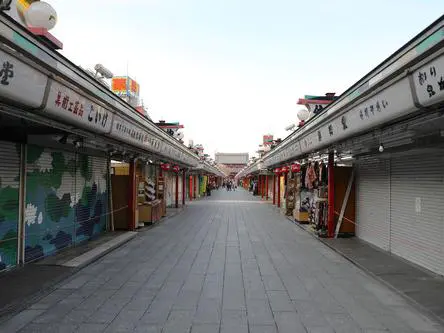Japanese Prime Minister Abe Shinzo on Tuesday called on the Japanese public to cooperate more in the nation's fight to prevent the further spread of the coronavirus.
Abe told a press briefing that the public needed to reduce the amount of contact they are having with other people, two weeks after he declared an initial state of emergency for Tokyo and six other prefectures that was extended on April 16 to cover the entire country.
While praising those who had been cooperating with central and local governments requests and staying and working from home as much as possible, he said people from Tokyo, the epicenter of the nation's COVID-19 outbreak accounting for more than one-third of the country's COVID-19 cases, had left the capital in large numbers over the weekend to take overnight trips.
The Japanese leader said that a large number of people from Tokyo headed to rural areas last weekend despite his repeated calls for people to refrain from leaving home or make unnecessary trips and try to achieve the goal of reducing contact between people by 80 percent.
People leaving Tokyo where 123 new daily cases were confirmed as of Tuesday evening, bringing the total number of infections in the capital to 3,307 from a nationwide total of 11,543 recorded COVID-19 cases, could see the virus spread to rural areas in Japan.
Such areas, which may have recorded none or very few cases, could quickly see the virus spread, but, unlike large cities like Tokyo, do not have the medical infrastructure to deal with a potential outbreak.
The prime minister also said that the upcoming Golden Week national holidays from the end of April to early May posed a very real risk of the virus spreading further.
Abe again called on people to refrain from taking trips, underscoring the fact that the nation's healthcare system is become overburdened.
In order to ease the strain on the healthcare system and save people's lives, Abe said that he would like more cooperation to achieve the goal of people significantly reducing contact to contain the spread of the virus that has taken the lives of a total of 294 people in Japan.
Despite the state of emergency giving prefectural governors the right to request certain businesses to close if they attract large number of people, some establishments have, as is their legal right, been defying the orders and keeping their doors open to attract customers.
On Tuesday, Economic Revitalization Minister Yasutoshi Nishimura said he may enforce tougher measures against such businesses that refuse the government's request to stay closed, in a bid to prevent them from allowing groups to gather where the pneumonia-causing virus can easily be passed on.
Nishimura specifically referred to some pachinko parlors which continued to allow customers to enter their facilities as usual and underscored Abe's point that people had been crossing prefectural borders to take overnight trips in rural areas.
With both central and prefectural governments gearing up to face Golden Week and the possibility that groups may leave urban areas en masse and head to rural ones for a vacation, a recent survey has revealed that Japanese people have also been continuing to commute to work.
According to a survey conducted by British research firm YouGov, only 18 percent of people in Japan have stopped going to work due to virus, which is the lowest level in 26 countries and territories covered by the survey.
"In Japan, where measures to tackle COVID-19 are not legally binding, many people have continued to commute to offices due to the difficulty in working remotely," Nippon Research Center, a Tokyo-based research group that carried out the Japan part of the survey from March 13 to April 13, said.
The YouGov survey covered a total of 27,000 people in 26 countries and territories in Europe, the Americas, the Asia-Pacific and the Middle East.
 简体中文
简体中文



